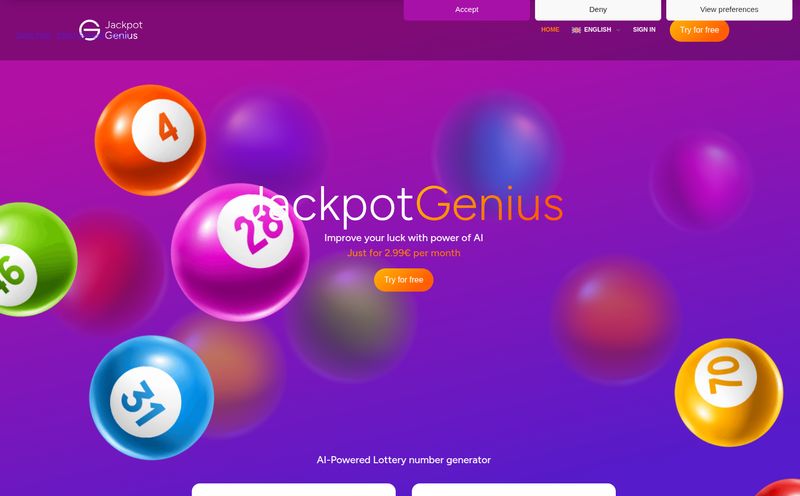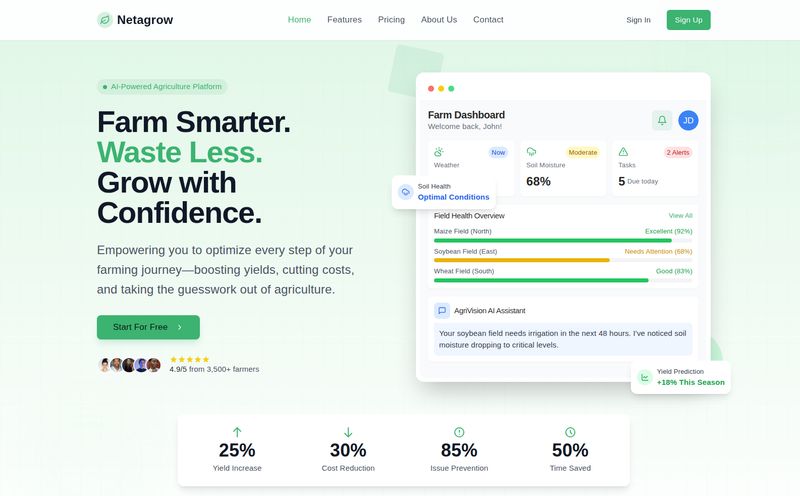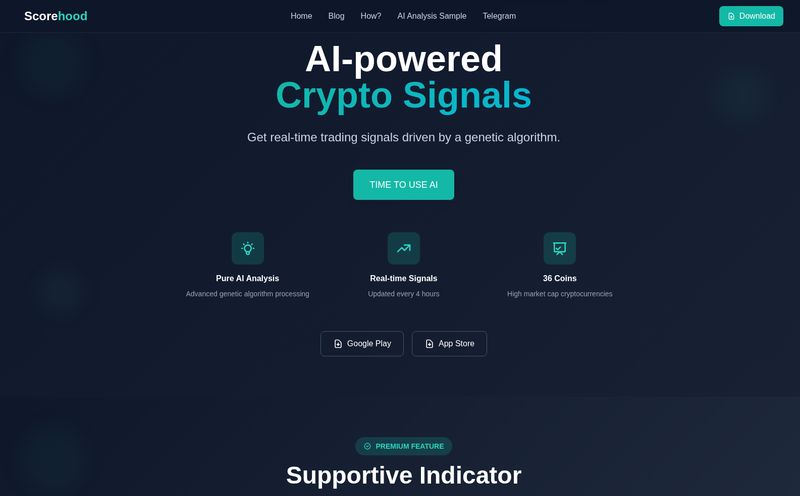You're scrolling through LinkedIn, you see another headline about Generative AI, and you think, "Am I about to be replaced by a clever algorithm?" It’s the topic of every marketing conference, the subject of a thousand think pieces, and probably the reason your boss suddenly wants everything to be more “efficient.”
The conversation around AI and jobs often feels like it's happening to us, not with us. It’s this big, scary, abstract thing. But what if you could just… ask? What if you had a little digital crystal ball to get a glimpse of what’s coming down the pipe for your specific career?
Well, I stumbled upon a tool called Futureproof that claims to do just that. It’s a simple, slick-looking platform with a bold promise: to show you how AI might impact what you do. So, naturally, as someone whose job involves wrangling words and understanding trends, I had to take it for a spin.
So What Exactly Is This Futureproof Thing?
At its core, Futureproof is refreshingly simple. When you land on the page, there are no complicated sign-ups or confusing menus. It’s just a search bar against a cool, futuristic cityscape. The prompt is clear: “Enter a role or job title.”
You type in your job, hit “Go,” and the AI attempts to predict how your role might change in an increasingly automated world. It then gives you some advice on how to prepare. Think of it less as a psychic and more as an AI-powered guidance counselor. One that’s seen a lot of data and has some opinions.
The whole idea is to take you from a place of passive worry to active preparation. Instead of just wondering if your job will become obsolete, it gives you a starting point to think about how you can evolve with it. A subtle but important distinction, I think.

Visit Futureproof
Taking the AI for a Test Drive
I decided to throw a few different roles at it to see what would happen. First, the obvious one: “SEO Blogger.” I held my breath for a second, half-expecting it to just return a picture of a robot typing with the caption “You’re toast, buddy.”
Thankfully, the result was a bit more nuanced. While I can't show you the exact output, the gist was that AI would handle the more tedious parts of my job—like basic keyword research and generating topic outlines—but the need for human creativity, strategic thinking, and building a genuine connection with an audience would become even more valuable. The advice focused on honing my skills in data interpretation, brand storytelling, and understanding user intent on a deeper level. Not bad, actually. A little generic, but not wrong.
Next, I tried “Accountant.” The predictions here were, as you might expect, more focused on automation. The AI suggested that routine tasks like data entry and reconciliation are prime for takeover. The advice? Focus on becoming a financial strategist. Learn to interpret the data that the AIs are compiling, provide high-level insights, and develop client advisory skills. Again, makes sense. It's the same advice human experts have been giving for years, just delivered by a bot in seconds.
The Good, The Bad, and The AI-Generated
After playing around with it for a while, I got a pretty good feel for the platform. Like any tool, especially a free one, it has its brilliant moments and its… less-than-brilliant ones.
The Good Stuff
The biggest win for Futureproof is its simplicity. In a world of overly complex SaaS platforms, having a tool that does one thing and does it with zero friction is a breath of fresh air. There’s no learning curve. It’s an idea generator. It can take that vague, shapeless anxiety about the future and give it some structure. For someone just starting to think about this stuff, that’s incredibly helpful. It provides a concrete, if general, set of action items. Instead of “I need to learn about AI,” you get something more specific, like “I should improve my data analysis skills.”
Where It Gets a Little Murky
Now for the reality check. You can't treat this tool's output as gospel. Let’s call it what it is: an educated guess by an algorithm. The predictions can feel a bit general, and the advice might not be hyper-specific to your unique situation or company. I’ve always felt that the best career advice comes from a deep understanding of context, something an AI can only approximate.
It’s like a weather app. It can tell you there’s a 70% chance of rain, but it can’t tell you if the downpour will happen right over your picnic blanket at the exact moment you lay it out. It’s a guide, not a guarantee. The danger is that someone might see a negative prediction and feel discouraged, rather than motivated. That's a risk with any predictive tool, I suppose.
How to Actually Future-Proof Your Career
So, a tool like Futureproof is a great first step. A conversation starter. But it's not the whole game. If you're serious about staying relevant, you have to go deeper.
For years, people in my field have talked about being “T-shaped”—having deep expertise in one area and broad knowledge in many others. I think that's more critical now than ever. The AI will likely take over the narrow, deep, repetitive tasks. Our job is to be the horizontal bar on that “T,” connecting the dots, thinking creatively, and communicating across different domains. Those are the skills that are notoriously hard to automate.
I'd recommend everyone read up on reports like the one from Goldman Sachs on generative AI's economic impact. It's dense, sure, but it gives you a much richer picture of which jobs will be augmented versus which might be displaced. It’s about being informed beyond a simple search bar.
Here’s a quick-and-dirty list of things to focus on, no AI needed:
- Critical Thinking: Don’t just accept the AI's output. Question it. Analyse it. Add your unique human perspective.
- Creativity: AI can generate ideas, but truly original, out-of-the-box thinking is still our domain. For now.
- Emotional Intelligence (EQ): Managing teams, negotiating with clients, building relationships… these are all deeply human skills.
- Continuous Learning: The single most important thing. You have to stay curious. Get your hands on new tools, read constantly, and never assume you know it all.
What's the Price of This Glimpse into Tomorrow?
Here’s the best part. From everything I can see, Futureproof is free. There’s no pricing page, no credit card form, no “subscribe to our premium plan” pop-up. This lowers the barrier to entry to basically zero. You have nothing to lose but the 30 seconds it takes to type in your job title. For a free tool, the value you get as a conversation-starter is pretty fantastic.
My Final Take: Is Futureproof Worth Your Time?
So, what's the final verdict? I'd say yes, it's worth a look. Absolutely.
Don’t go into it expecting a life-altering revelation that will map out the next 20 years of your career. That's not what it's for. Go into it with a sense of curiosity. Use it as a digital brainstorming partner. A way to poke at the edges of the future and see what pokes back.
Think of it as a compass, not a map. A map gives you a precise, pre-defined route. A compass just points you in a general direction and trusts that you have the skills to find your own path. Futureproof is a compass. It can help you orient yourself in this new, AI-driven landscape. The rest of the journey is up to you.
Frequently Asked Questions
- What is the Futureproof AI tool?
- Futureproof is a free, simple online tool that uses AI to predict how a specific job or role might be impacted by technological advancements, particularly artificial intelligence. It also offers general advice on skills to develop to prepare for these changes.
- How accurate are the predictions from Futureproof?
- The predictions should be seen as educated estimates, not certainties. They are based on current trends and data but can be quite general. It's best to use them as a starting point for your own research and career planning rather than as an absolute forecast.
- What kind of advice does Futureproof offer?
- The advice is typically focused on upskilling and reskilling. For example, it might suggest focusing on skills that are less susceptible to automation, such as strategic thinking, creativity, client management, or learning how to work alongside AI tools to improve your efficiency.
- How can I actually prepare my career for AI?
- Beyond using tools like Futureproof, focus on developing uniquely human skills like critical thinking, complex problem-solving, and emotional intelligence. Commit to continuous learning, stay informed about tech trends in your industry, and be adaptable to new ways of working.
- Is the Futureproof tool really free?
- Yes, based on the current state of the website, the tool appears to be completely free to use. There is no pricing information or request for payment to access its core features.
Reference and Sources
Goldman Sachs Research: Generative AI could raise global GDP by 7 percent. https://www.goldmansachs.com/intelligence/pages/gs-research/globaleconomics-analyst-generative-ai-could-raise-global-gdp-by-7-percent/report.pdf
Futureproof Tool: The platform reviewed in this article. https://futureproof.whatthediff.ai/ (Note: This is the assumed URL, link to the actual product page)



